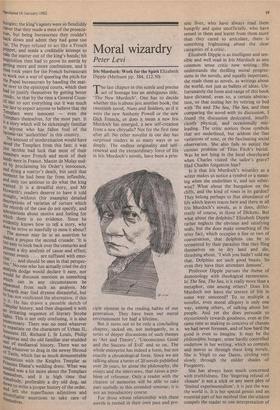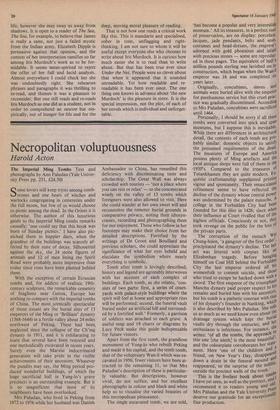Moral wizardry
Peter Levi
The last chapter in this subtle and precise act of homage has an ambiguous title, `The New Murdoch'. One has to decide whether this is about just another book, the twentieth novel, Nuns and Soldiers, as if it were the new Anthony Powell or the new Dick Francis, or does it mean a new Iris Murdoch has emerged, a new self-creation from a new chrysalis? Not for the first time after all. No other novelist in our day has surprised readers in so many ways or so deeply. The endless originality and self- renewal and the extraordinary force of life in Iris Murdoch's novels, have been a prin-
ciple element in the reading habits of our generation. They have been our moral entertainment for half a lifetime.
But it turns out to be only a concluding chapter, tacked on, not inelegantly, to a series of deeper discussions of such themes as 'Art and Theory', 'Unconscious Good and the Success of Evil' and so on. The whole enterprise has indeed a form, but not exactly a chronological form. Since we are talking about a`series of 20 novels publighed over 26 years, let alone the philosophy, the essays and the interviews, that raises a pro- blem of reference. Only a reader with the clearest of memories will be able to take part usefully in this extended seminar; it is not an introductory course.
For those whose relationship with these novels is rooted in their own past and pre- sent lives, who have always read, them hungrily and quite unofficially, who have sensed in them and learnt from them more than they cared to articulate, there is something frightening about the clear categories of a critic.
Elizabeth Dipple is as intelligent and sen- sible and well read in Iris Murdoch as any common sense critic now writing. She understands the thrilling moral progres- sions in the novels, and equally important, she reads them as novels, as writings about the world, not just as ballets of ideas. Un- fortunately the form and range of this book have dictated, even so, a certain abstrac- tion, so that testing her by retiring to bed with 'flu and The Sea, The Sea, and then comparing the novel with its discussion, I found the discussion desiccated, insuffi- ciently physical, and occasionally mis- leading. The critic notices those symbols that are underlined, but seldom the fine variations of tone, or the fascinating social observation. She also fails to notice the curious problem of Titus Fitch's burial. Was he not lying in the local churchyard when Charles visited the sailor's grave? Had Charles forgotton him?
Is it that Iris Murdoch's wizardry as a writer makes us notice a symbol or a mean- ing when she underlines it, and not other- wise? What about the bungalow on the cliffs, and the kind of roses in its garden? They belong perhaps to that abundance of life which leaves traces here and there in all Iris Murdoch's novels, as it does, differ- rently of course, in those of Dickens. But 'what about the dolphins? Elizabeth Dipple rather neglects the obvious and satisfying seals, but she does make something of the stray fact, which occupies a line or two of conversation, that dolphins can be so tormented by their parasites that they fling themselves on to dry land and die, thrashing about. 'I wish you hadn't told me that. Dolphins are such good beasts. So even they have their attendant demons'.
Professor Dipple pursues the theme of demonology with theological earnestness. In The Sea, The Sea, is it really more than a metaphor, one among others? Does Iris Murdoch not leave the texture of life in some way unscored? To so multiple a novelist, even moral allegory is only one way, among others, of talking about her people. And yet she does persuade us mysteriously towards goodness, even at the same time as making us conceive of chasms we had never foreseen, and of how hard the good is even to imagine. It may be the philosophic hunger, some hardly controlled undertow in her writing, which so compels and moves us through these long novels. She is Virgil to our Dante, circling very slowly through the milder shades of Purgatory.
She has always been much concerned with truthfulness. The 'lingering refusal of closure' is not a trick or any mere ploy of 'limited experimentalism'; it is just the way the world is. It is her special genius and an essential part of her method that she seldom compels the reader to one interpretation of
life, however she may sway us away from shadows. It is open to a reader of The Sea, The Sea, for example, to believe that James is really a saint, not just a failed mystic from the Indian army. Elizabeth Dipple is persuasive against that opinion, and the context of her interpretation ramifies so far among Iris Murdoch's work as to be for- midable. It seems mean-spirited to reject the offer of her full and lucid analysis. Almost everywhere I could check her she was undoubtedly right. She rehearses phrases and paragraphs it was thrilling to re-read, and themes it was a pleasure to reconsider. But one still reads and re-reads Ifis Murdoch as one did as a student, not in order to comprehend an oeuvre but em- pirically, out of hunger for life and for the
deep, moving moral pleasure of reading.
That is not how one reads a critical work like this. This is mandarin and specialised, sober in tone, unflagging and right- thinking. I am not sure to whom it will be useful except everyone else who chooses to write about Iris Murdoch. It is curious how much easier she is to read than to write about. But that has been true ever since Under the Net. People were so clever about that when it appeared that it sounded unreadable. Yet how readable and re- readable it has been ever since. The one thing one knows in advance about 'the new Murdoch' is the pleasure in store. It is the special impression, not the plot, of each of her novels which is individual and unforget- table.



































 Previous page
Previous page